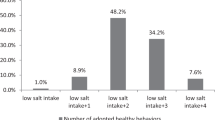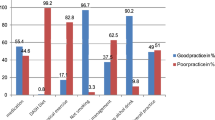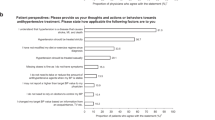Abstract
High blood pressure is becoming a universal epidemic for both developed and developing countries; it is one of the main public health problems all over the world. This research was conducted to assess blood pressure self-care among hypertensive patients in Iran. This cross-sectional analytic study was conducted on 527 patients with hypertension recruited from Zarandieh, Iran in 2018. Data were gathered using questionnaires assessing socio-demographic information, social support, health belief model (HBM) constructs (perceived benefits to healthy behavior, barriers to healthy behavior, perceived disease threat, self-efficacy to engage in healthy behavior, and cues to action), and self-care activities to address blood pressure. A stepwise multiple linear regression analysis was used to determine factors associated with self-care behaviors. Overall, 512 patients (215 men and 297 women) participated in this study. Participants who were married, and more educated engaged in more self-care behaviors. At least one-half of the patients (47.6%) demonstrated a moderate level of self-care behaviors with a mean score of self-care equal to 9.32 ± 3.6 (out of 18). All the elements of HBM and social support were significant predictors of self-care behaviors and self-efficacy was the strongest predictor, followed (in descending order) by perceived barriers, social support, perceived disease threat, and perceived benefits. Health education based on HBM, enhanced with attention to social support, may help patient enact healthier behaviors to reduce blood pressure.
This is a preview of subscription content, access via your institution
Access options
Subscribe to this journal
Receive 12 digital issues and online access to articles
$119.00 per year
only $9.92 per issue
Buy this article
- Purchase on Springer Link
- Instant access to full article PDF
Prices may be subject to local taxes which are calculated during checkout

Similar content being viewed by others
Data availability
Upon request, we can offer onsite access to the data.
References
Chopra H, Nanda NC. Textbook of cardiology (a clinical & historical perspective). JP Medical Ltd; 2012. https://www.amazon.com/s?k=9789350900819&i=stripbooks&linkCode=qs.
Park S, Buranakitjaroen P, Chen C-H, Chia Y-C, Divinagracia R, Hoshide S, et al. Expert panel consensus recommendations for home blood pressure monitoring in Asia: the Hope Asia Network. J Hum Hypertens. 2018;32:249–58.
World Health Organization. Silent killer, global public health crisis. 2013. http://www.who.int/campaigns/world-health-day/2013/en/.
Agyemang C, Oudeman E, Zijlmans W, Wendte J, Stronks K. Blood pressure and body mass index in an ethnically diverse sample of adolescents in Paramaribo, Suriname. BMC Cardiovasc Disord. 2009;9:19.
World Health Organization. GHO data. 2017. http://www.who.int/gho/ncd/risk_factors/blood_pressure_prevalence_text/en/.
Omar SM, Elnour O, Adam GK, Osman OE, Adam I. Assessment of blood pressure control in adult hypertensive patients in eastern Sudan. BMC Cardiovasc Disord. 2018;18:26.
Motlagh Z, Fazel S, Chaman R, Ghafari SR, Parisay Z, Golabi MR, et al. Knowledge, treatment, control, and risk factors for hypertension among adults in Southern Iran. Int J Hypertens. 2015;2015:897070.
Flynn SJ, Ameling JM, Hill-Briggs F, Wolff JL, Bone LR, Levine DM, et al. Facilitators and barriers to hypertension self-management in urban African Americans: perspectives of patients and family members. Patient Prefer Adherence. 2013;7:741.
Chodosh J, Morton SC, Mojica W, Maglione M, Suttorp MJ, Hilton L, et al. Meta-analysis: chronic disease self-management programs for older adults. Ann Intern Med. 2005;143:427–38.
Warren-Findlow J, Seymour RB, Huber LRB. The association between self-efficacy and hypertension self-care activities among African American adults. J Community Health. 2012;37:15–24.
Li WW, Wallhagen MI, Froelicher ES. Hypertension control, predictors for medication adherence and gender differences in older Chinese immigrants. J Adv Nurs. 2008;61:326–35.
Glasgow RE, Toobert DJ. Social environment and regimen adherence among type II diabetic patients. Diabetes Care. 1988;11:377–86.
Glanz K, Rimer BK, Viswanath K. Health behavior and health education: theory, research, and practice. John Wiley & Sons; 2008. https://books.google.com/books?hl=en&lr=&id=1xuGErZCfbsC&oi=fnd&pg=PT12&dq=Health+behavior+and+health+education:+theory,+research,+and+practice:+John+Wiley+%26+Sons&ots=-q169G__0s&sig=zlnilKYgE8x1B3n9iAzk0xXwScA#v=onepage&q=Health%20behavior%20and%20health%20education%3A%20theory%2C%20research%2C%20and%20practice%3A%20John%20Wiley%20%26%20Sons&f=false.
Orji R, Vassileva J, Mandryk R. Towards an effective health interventions design: an extension of the health belief model. Online J Public Health Inform. 2012;4:218–29.
Robinson TD. Hypertension beliefs and behaviors of African Americans in seleceted cleveland public housing. Canterbury [dissertation]: Kent State University College of Education, Health and Human Services; 2012. https://etd.ohiolink.edu/pg_10?0::NO:10:P10_ACCESSION_NUM:kent1352827584.
Kamran A, Ahari SS, Biria M, Malpour A, Heydari H. Determinants of patient’s adherence to hypertension medications: application of health belief model among rural patients. Ann Med Health Sci Res. 2014;4:922–7.
Ali NS. Prediction of coronary heart disease preventive behaviors in women: a test of the health belief model. Women Health. 2002;35:83–96.
Yue Z, Li C, Weilin Q, Bin W. Application of the health belief model to improve the understanding of antihypertensive medication adherence among Chinese patients. Patient Educ Couns. 2015;98:669–73.
Shameena A, Badiger S. Retracted: medication adherence and health belief model among hypertensive patients attending rural health centres of a tertiary care hospital in South India. Int J Community Med Public Health. 2017;4:1159–65.
Ma C. An investigation of factors influencing self-care behaviors in young and middle-aged adults with hypertension based on a health belief model. Heart Lung. 2018;47:136–41.
Karimy M, Koohestani HR, Araban MJD. The association between attitude, self-efficacy, and social support and adherence to diabetes self-care behavior. Diabetol Metab Syndr. 2018;10:86.
Bagherian-Sararoudi R, Hajian A, Ehsan HB, Sarafraz MR, Zimet GD. Psychometric properties of the Persian version of the multidimensional scale of perceived social support in Iran. Int J Prev Med. 2013;4:1277.
Taher M, Bayat ZS. Correlation between compliance regimens with health locus of control in patients with hypertension. Med J Islam Repub Iran. 2015;29:194.
Khan A, Dickens AP, Adab P, Jordan RE. Self-management behaviour and support among primary care COPD patients: cross-sectional analysis of data from the Birmingham Chronic Obstructive Pulmonary Disease Cohort. NPJ Prim Care Respir Med. 2017;27:46.
Ademe S, Aga F, Gela D. Hypertension self-care practice and associated factors among patients in public health facilities of Dessie town, Ethiopia. BMC Health Serv Res. 2019;19:51.
Pereira MG, Berg-Cross L, Almeida P, Machado JC. Impact of family environment and support on adherence, metabolic control, and quality of life in adolescents with diabetes. Int J Behav Med. 2008;15:187–93.
Gao J, Wang J, Zheng P, Haardörfer R, Kegler MC, Zhu Y, et al. Effects of self-care, self-efficacy, social support on glycemic control in adults with type 2 diabetes. BMC Fam Pract. 2013;14:66.
DiMatteo MR. Social support and patient adherence to medical treatment: a meta-analysis. Health Psychol. 2004;23:207.
Lee J-E, Han H-R, Song H, Kim J, Kim KB, Ryu JP, et al. Correlates of self-care behaviors for managing hypertension among Korean Americans: a questionnaire survey. Int J Nurs Stud. 2010;47:411–7.
Bandura A. Health promotion by social cognitive means. Health Educ Behav. 2004;31:143–64.
Azizi N, Karimy M, Salahshour VN. Determinants of adherence to tuberculosis treatment in Iranian patients: application of health belief model. J Infect Dev Ctries. 2018;12:706–11.
Yee KC, Md Said S, Abdul, Manaf R. Identifying self-care behaviour and its predictors among type 2 diabetes mellitus patients at a district of Northern Peninsular Malaysia. Malaysian J Med Health Sci. 2018;14:17–29.
Cheng L, Sit JW, Leung DY, Li X. The association between self‐management barriers and self‐efficacy in chinese patients with type 2 diabetes: the mediating role of appraisal. Worldviews Evid Based Nurs. 2016;13:356–62.
Karimy M, Araban M, Zareban I, Taher M, Abedi A. Determinants of adherence to self-care behavior among women with type 2 diabetes: an explanation based on health belief model. Med J Islam Repub Iran. 2016;30:368.
Zamani-Alavijeh F, Araban M, Koohestani HR, Karimy M. The effectiveness of stress management training on blood glucose control in patients with type 2 diabetes. Diabetol Metab Syndr. 2018;10:1–9.
Acknowledgements
We gratefully acknowledge the very helpful participation of the patients; without whose contribution the present study would not have been completed. Also, the authors would like to thank Bahram Armoon for helping us with some parts of data collection.
Author information
Authors and Affiliations
Contributions
MK collected the data and collaborated on design. IZ, MA, MB, FZA, and MK designed the study and analysis; participated in interpretation of results and writing. LARS assisted with interpretation of results and with writing. MK provided the final version of the paper. All of authors read and approved the paper.
Corresponding author
Ethics declarations
Conflict of interest
The authors declare that they have no conflict of interest.
Ethical approval
The Ethics Committee of Saveh University of Medical Sciences approved the study protocol (IR. SAVEHUMS. REC.1395.02).
Informed consent
Participation was voluntary, and participants were fully debriefed about the aims and objectives of the study and gave informed written consent.
Additional information
Publisher’s note Springer Nature remains neutral with regard to jurisdictional claims in published maps and institutional affiliations.
Supplementary information
Rights and permissions
About this article
Cite this article
Zareban, I., Araban, M., Rohani, M.R. et al. High blood pressure self-care among hypertensive patients in Iran: a theory-driven study. J Hum Hypertens 36, 445–452 (2022). https://doi.org/10.1038/s41371-020-00429-9
Received:
Revised:
Accepted:
Published:
Issue Date:
DOI: https://doi.org/10.1038/s41371-020-00429-9
This article is cited by
-
Effectiveness of a mobile-based educational intervention on self-care activities and glycemic control among the elderly with type 2 diabetes in southwest of Iran in 2020
Archives of Public Health (2022)
-
Spotlight on hypertension in the Middle-East
Journal of Human Hypertension (2022)



